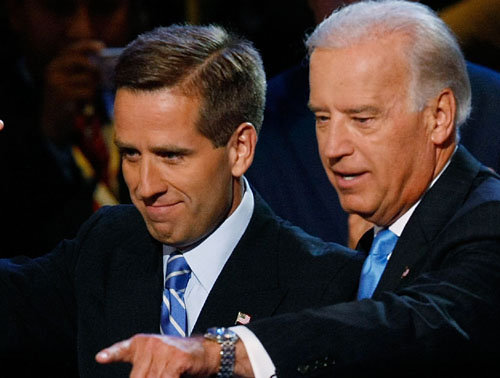By Chris Slavens
The Democrats’ future in the U.S. Senate looks even gloomier following Delaware Attorney General Joseph R. “Beau” Biden’s announcement on January 25 that he would not run for the seat vacated by his father, Vice President Joseph R. “Joe” Biden, Jr. Democrats at the national level, unnerved by a recent series of Republican victories in special elections, had looked to the younger Biden as their best hope for keeping both of the First State’s Senate seats in Democratic hands. The refusal of the vice president’s son to run for Senate in the nation’s second-smallest state says a lot about the current political climate.
Delawareans have been voting for (or against) Bidens since 1969, when 26-year-old Joe Biden ran for county council and won, only to run for U.S. Senate two years later, bypassing the usual political ladder of state offices and scoring a tremendous upset victory over Republican incumbent J. Caleb Boggs. In 2006, his son ran for state attorney general, successfully relying on family name recognition to defeat an opponent that was significantly better qualified. Of course, most followers of national-level politics probably have one question about the goings-on of Delaware: Who the heck cares?
The Obama administration cares. So does the Democratic Senatorial Campaign Committee, and Democrats across the country who see their Senate majority slipping away, one seat at a time. The fact is, Biden was their only hope to defeat Delaware’s Republican candidate, current U.S. Representative Michael Castle, a former two-term governor whose moderate status has earned him nine House terms in a strongly Democratic state. Barring a miracle for Democrats, Castle will occupy a seat held by their party since 1972.
Sound familiar? Massachusetts, anyone? If Democrats have learned anything from recent losses, it is that they do not own certain states or offices, regardless of history or tradition. Their compliance with the president’s radical agenda is fueling a popular nonpartisan tea party movement, and awakening citizens who have previously stayed out of politics. Just as the Senate seat recently won by Scott Brown has been called “the Kennedy seat,” so could Delaware’s, temporarily held by placeholder Ted Kaufman, be called “the Biden seat.”
No longer. The younger Biden’s wise decision not to run, thereby protecting his political future, should be a warning sign for other Democrats, as well as the White House. A prominent figure in a tiny state is unwilling to run despite his party’s urging, while the current administration and Congress are losing popularity. It is not a coincidence. How will Democrats fare in more moderate, evenly-divided battleground states, with candidates that cannot lean on local popularity and power like that of the Biden family?
Republican Scott Brown’s recent upset victory taught us a lesson, or should have. Political parties or families do not own seats, and dissatisfaction with a White House agenda can affect local races. The lesson from Delaware, in the form of “Beau” Biden’s refusal to run, is that at least one Democrat has learned from what happened in Massachusetts, and now, faced with the prospect of a loss in the November election, is unwilling to wager his political future for the sake of a floundering party. In the coming months, as campaign filing deadlines draw closer, how many other would-be candidates will discover that, like Biden, they are not gamblers?
Chris Slavens, former contributor to the Wilmington News Journal, is a Liberty Features Syndicated writer.


